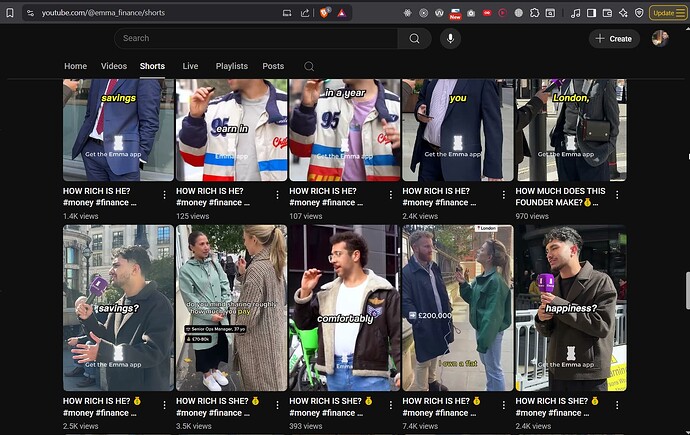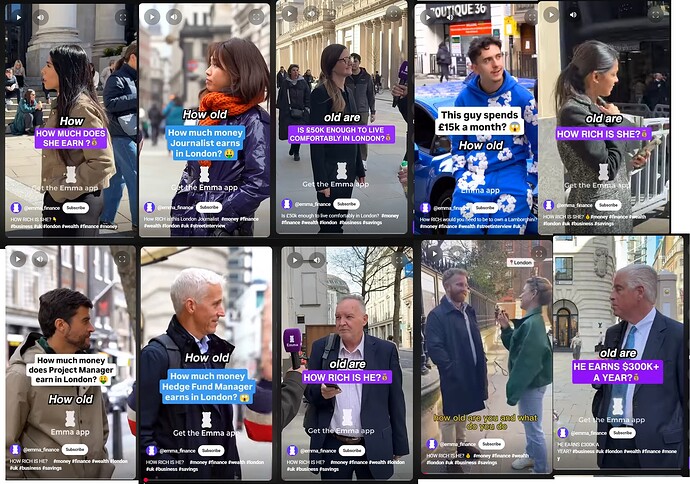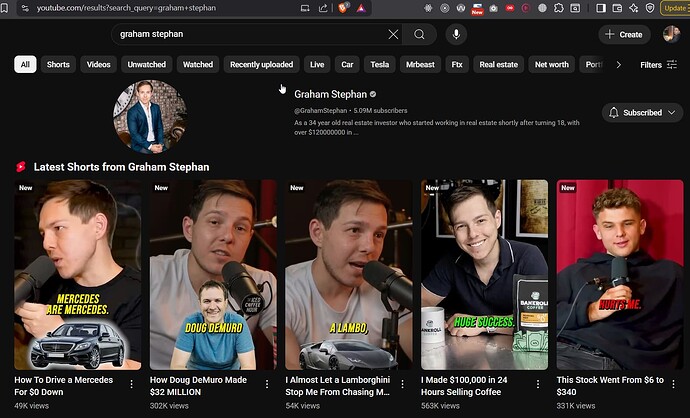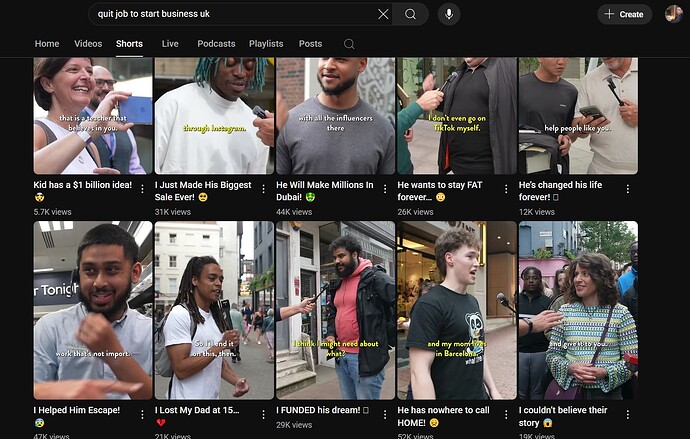Hey @edoardomoreni ! I’ve spent some time reviewing Emma across the board, from marketing and social media content to the product, development, and design, and I really believe there’s a lot of untapped opportunity to improve and grow the brand.
I’ll start of with marketing and in later posts write about other topics such dev, and landing page.
Part 1: Current (Audit - Improving Emma’s Marketing: Strategy…)
Part 2: Website Audit Audit - Emma's Website Issues
Part 3: Coming soon
Part 4: Maybe Coming soon
Marketing Strategy
Emma’s current marketing, when it comes to video content on platforms like YouTube Shorts, Facebook etc… feel repetitive and formulaic. Questions such as:
- “How much do you pay in rent?”
- “How rich is she/he?”
- “How much do you make?”
… while initially they MIGHT have been effective, the novelty wears of quickly. As a viewer you realise that every person earns/makes/pays random figures no matter how they look, and younger people have less more than older - which everyone knows.
There is no compelling reason to watch anymore videos, audiences become desensitized, and the content starts to blend together. Without a compelling reason to keep watching, viewers disengage, which means you’re losing influence, reducing long-term ROI, and ultimately making the content less profitable.
To stand out and stay relevant, Emma App has to evolve beyond being just another “meme” account on social media. You must provide real value - either through education, humor, or emotionally resonant storytelling.
Marketers sell by giving 90% free and charging for that 10%.
Provide real valuable content, education, real advice, an interview, something off value. Not the same thing over and over again with once a while scripted interviews with a hard sell on Emma App.
Think of this as a TV show, you watch a real estate show to hook you in, just to have an ad break in the middle with a nice ease in - people will be coming back because they love the show, and meanwhile they get to see your ads.
Even better if they start sharing your content because they find it valuable.
But you’re not going to get there by doing one thing over and over again that doesn’t have that many views or engagement - and you’ve been doing this strategy for a long time now.
Also every video starts with “How old are you?” - boring hook. You need a better hook.
Re-think Content
Your content feels like a hard sell, some of it is scripted, with a boring infomercial at the end of some videos “Use XYZ app”. You better of creating great videos and don’t mention emma app in every short - because that too, gets boring. Mention it once a while. Don’t spam the user like me with emma emma emma - that’s annoying.
Your content risks triggering viewers a psychological reactance due to repetitive product mentions and a scripted feel. It might work better if you prioritize engaging content first and integrate your product more subtly and occasionally - viewers value authenticity and will engage more when they trust you’re not just trying to sell them something every time.”
To build long-term engagement and authority, the channel needs variety, structure, and editorial tension - stories with a beginning, middle, and end, and content that plays into curiosity, relatability, or even controversy.
People get attached to emotions. There was a lot of support for the guy on the guitar in the comments somewhere. if you helped him out, and year from now he became successfull, and you made an interview… people would see this transformation and re-share it with love.
You need to re-strategise content. I will go deeper into some example, but first I want to share some strategies you can do now.
SEO
With every video being the same, and having same title, you’re missing out on SEO.
I would suggest to build a catalog of different types of questions people might have, that way if someone has a question, you’re more likely to pop up for that.
People will look for “How to buy a house”, etc… you can come up for that search.
You have low-effort but high-return when structured correctly:
- “How much money do you need to buy a house in London?”
- “Can you survive in London on £2,000/month?”
- “Should you rent or buy in 2025?”
- “How I bought a flat in London with 5% down”
- “Why I left my tech job for trading full-time”
- “Is £50,000 a year a good salary in London in 2025?”
- “How to move to the UK with no savings”
Bonus point, this is also likley to be recommended in AI like ChatGPT, you could even try to make ChatGPT reference your videos with some magic - that’s a bonus if you can make it happen - you’ve got London engeeners, figure it out - no one’s doing it, be the first.
But first, you need good content.
Re-occurring Topics
There are topics you can re-record every single year - and they actually work better that way. That’s because some subjects lose value quickly if they’re not current. People want updated answers for right now, not last year. That’s a 101 marketing strategy.
For example:
- How much do you need to live in London in 2025?
- Cost of living breakdown: UK vs Europe (2025)
- What’s a realistic salary for a 25-year-old in 2025?
- How much you should have saved by 30 (2025 edition) (and what to do if you have no savings)
- Is £1,000 enough to start investing this year?
- Budgeting in 2025: What’s changed?
- My 2025 money routine (realistic + updated)
- Top financial mistakes people still make in 2025
These are evergreen in structure but timely in content — so you can revisit them every year and keep building SEO + authority.
Keep Up with News & Trending Topics
It’s important to stay current with news, especially when it involves high-profile financial events - like Jeff Bezos getting divorced or married. These stories generate huge search interest and can quickly go viral. For example, a video titled “Asking Londoners about Jeff Bezos’ $50 million wedding” or even better, visiting wealthy neighborhoods to get millionaires’ reactions could attract massive views. The key is to strategically balance your content mix: have some videos that educate on financial topics, others that capitalize on trending news and celebrity money stories, and some that are just fun and engaging. This diversified approach keeps your channel relevant, searchable, and shareable.
You had soo much media coverage about Jeff Bezos, soo many YT videos, and you haven’t capitalised on this a single bit. Missed opportunity.
There’s a maybe trending maybe not video idea: Ask people what they think of the “free tax” up till £45k - ask them if they will make more money, if employeers are going to offer less money now, etc… could be popular in the UK - when news hit big, or when the law passes - Have a batch of this. If the law doesn’t pass, oh well.
Contrarian or Clickbait Titles (with a Real Payoff)
Clickbait doesn’t have to be cheap. When used right, it’s strategic curiosity - and you resolve it honestly in the content. These titles make people stop scrolling.
Examples:
- “Why saving money is a trap” - You explain that earning more beats penny-pinching.
- “Being broke in your 20s is smart?” - Challenge that advice and explain the real strategy.
- “Don’t invest in your 20s” - Pivot: “Invest in yourself first — skills, not stocks.” (seeing this from an financial company will sound intriguing needing to check)
- “Why budgeting doesn’t work for poor people” - Talk about systemic barriers and mindset shifts.
- “Should you get a prenup?” - Frame it from a financial planning perspective.
- “Jeff Bezos’ Divorce: Should you worry about your money?” - Tap into trending topics.
- “Spent £500 on drinks in one night, was it worth it?” - Use real stories to unpack bad habits.
Narrative-Based Interviewing is better than Static Questions
Instead of just asking, “How much do you pay in rent?” - pull a story out of them.
Try:
- “Tell me about the first time you were broke in London.”
- “What’s the most expensive mistake you’ve ever made?”
- “How did you land your job — and what do you actually earn?”
- “How long did it take you to buy your first home?”
Clip these into shorts, emotional beats, and learning moments. These mini-narratives outperform generic data points because they’re human - and people remember them.
No one’s gonna care or remember some spoiled kid from London spending 10k a month.
Content Audit
“How to grow your finances”!
VIDEO: https://www.youtube.com/shorts/yVCFdhdPU5o
This video is a blatant, scripted hard sell disguised as financial advice, prioritizing promotion over authenticity. Its 30-second Q&A format - featuring a staged “Ooo so how does that work” from a female voice and a rapid “NONONO” rebuttal from a male presenter - feels like rehearsed acting, with the heavy-handed push for the Emma app undermining any genuine value in the rent-reporting tip.
The transactional tone, lack of emotional connection, and absence of broader context or alternative solutions make it come across as cold and inauthentic, likely alienating viewers who are skeptical of such “astroturfed” ads. While the concept could offer minor educational value, the video’s polished, salesy delivery and clear affiliate agenda render it a shallow, unengaging pitch that feels more like a full blown, cold commercial than a helpful Short.
Hit Piece Stories You’ve Missed
Most videos lack depth, which is expected when filming strangers on the street. But a few golden moments slipped right through your fingers. These could’ve been viral stories with real impact, not just throwaway clips. Here’s what you missed:
The Broke Guitar Guy
VIDEO: https://www.youtube.com/shorts/hfAvbin7NTM
Huge opportunity miss.
The video ends with the guy saying, “If you’re young, spend the money, don’t bother saving.”
Is that really the message Emma App wants to stand behind?
That was your cue to interject, challenge, and educate. Instead, it just fades out - and leaves viewers with some pretty reckless financial advice.
You had the perfect setup to turn this into something meaningful. You could have said:
“What if you could do everything you’re doing now - playing music, living free - but without constantly worrying about money?”
He’s already showing up every day, guitar in hand, doing the hard part. Why not suggest he sets up a camera and starts recording his sessions? No money for gear? Fund it. That’s a tax write-off, can’t edit? Upload raw - and potentially a viral story in the making.
You could’ve turned this into a transformation arc.
You could’ve:
- Stitched the clip with a counter-opinion.
- Helped him build a basic budget.
- Suggested ways to monetize his talent.
- Turned this into educational content tied to your app.
Imagine he then goes to interviews as a self-made guy, in the long game, someone asks him how did you start…
“I was broke, playing guitar on the streets of London, barely making a grand a month. Emma App came by, gave me some advice - start a YouTube channel, budget better (I actually use Emma App - haha), monetize my content. And the rest is history.”
That’s a forever story. You imprint yourself into someone’s origin. Those are rare - but when you catch them, and you’ve got a team? You can turn moments into magic.
Instead, the clip just ends with bad advice.
No pushback. No takeaway. No value. Huge potential for the guy.
Massive miss…
And if you think this is unrealistic, you’re not thinking big enough.
CHECK THIS OUT: https://www.youtube.com/shorts/-or5CLiuR3c
Check that guy’s profile - learn from him.
Disguised Millionare
VIDEO: https://www.youtube.com/shorts/RoReRk6lLX4
Another missed opportunity - and this one had serious depth potential.
You’re talking to a guy casually dropping that he spends £20k/month - with a tone that suggests it’s probably more. He mentions flying private jets. There’s a good chance this guy’s a multi-millionaire, and yet, the convo just… floats by.
He even hints at crime. That’s a hook. Ask:
“Is being wealthy in London dangerous?”
“Do you feel like you have to hide your wealth?”
“How do you stay grounded when you’re playing at that level?”
Then go deeper. Get real with him:
- “What do you actually do?”
- “Did you grow up with money, or did you build it?”
- “What’s your relationship with money now?”
- “Do you still budget?”
- “Do you think millionaires should budget?”
Right there - you’re not selling Emma App, but you’re setting up the entire point of Emma. When someone at that level says, “Yeah, even with millions, I still need to know where my money’s going”, boom. The message is loud without being preachy.
It’s subtle. Sophisticated. Relatable to everyone watching - because now they’re hearing that even the ultra-wealthy think about managing their money. You’re shaping a narrative.
But instead, it’s just:
“How much do you spend?”
“Oh, 20k a month.”
[cut to the next person]
No story. No context. No punch.
You don’t need to pitch the app every time. In fact, you shouldn’t.
Some videos should just sit. Let the depth and nuance carry it. That’s how you earn long-term trust and attention - not just downloads.
This was a rare guest - someone with real wealth, real experience, real answers. You could’ve walked away with something timeless. But again, it was treated like just another headcount on the street.
The Girl whos Daddy funds lifestyle
Another missed opportunity for real value.
You’ve got this girl living in central London, dropping 5-8k a month on shopping, rent paid by her dad, and she’s thanking God that she “can do anything.” Cool - but where’s the challenge?
That was your moment to step in and add real weight to the conversation.
You could’ve asked:
“What happens if your dad stops paying for everything?”
“Are you set up to stand on your own if life suddenly changes?”
“It’s amazing you’re supported right now — but are you building anything for yourself?”
This is where Emma App should shine. Budgeting isn’t just for broke students, it’s about resilience, freedom, and choice. You missed the chance to reframe her situation as one that’s potentially fragile.
It’s not about being negative - it’s about being real. Life changes. Things happen. Not everything is permanent. And if you’re promoting financial literacy and empowerment, this is the exact moment you lean in.
She clearly has access to resources, lifestyle, support - so flip it:
“You’re in a privileged position right now. What would it look like to invest in yourself? To build safety, not just spend it all? What happen if your father dies?”
That’s how you turn a flashy story into an actual message.
Instead, what we got was:
Expensive lifestyle + no critical thought + next question.
Flat. Forgettable. No takeaway.
“How much does this founder make?”
VIDEO: https://www.facebook.com/reel/971020248572635
The guy says he’s a founder - not your average 9–5 employee. That alone should’ve triggered a deeper dive.
He claims he spends £5k/month…
Then casually drops that he only makes £35k/year.
That math doesn’t add up - and the moment just slides right by.
Why was there no follow-up? No “Wait - how are you affording that?” No curiosity about whether he’s surviving off debt, savings, family help, or lying. That’s where the real conversation begins.
He’s a founder in the fashion space - that’s interesting!
You had the perfect opportunity to dig deeper:
- Is his business making money?
- Is he paying himself a salary?
- Is he funding his lifestyle with credit?
- Would he be open to a longer interview?
This is someone operating below his burn rate - the exact type of person who needs budgeting support, planning tools, and clarity around cashflow. That’s where Emma App should naturally step in.
Instead, the format stays surface-level:
Ask question - get answer - move on.
No story. No takeaway. No angle.
And that’s the core issue - you’re meeting people with real stories: founders, creatives, entrepreneurs, even millionaires. High-potential guests. But there’s no depth, no curiosity, no follow-through. You’re letting golden moments float right by.
Want to stand out? Don’t just get the answer - chase the why.
Otherwise, you’re just doing a more aesthetic version of street interviews we’ve all seen before.
Long-Term Play: Become the Voice of UK Personal Finance
Zoom out. What does the big picture look like?
Emma doesn’t just track expenses.
Emma shapes how people think about money.
Build out a YouTube-first finance education channel. Start a podcast. Interview first-time buyers, landlords, immigrants, tech workers…
Even better if you can meet customers on the street that use Emma…
How about having things like you sit in London and say “Investing in your 20ties is a bad idea - change my mind” - you should invest in yourself - you bite, but hope somene sits down and has a talk.
Hold real interviews in Shoreditch, Canary Wharf, outside Barclays HQ.
Tie in the product naturally:
Offer talks in universities, schools, and colleges. Give pizza to get attendance. Film them. Upload them. Create viral soundbites like:
“Becoming a millionaire in your twenties - the truth they don’t tell you.”
Eventually, bring in guests like:
- Property YouTubers
- Solo founders
- Gig workers
- Finance TikTok creators
Connect with big youtubers like Graham Stephan etc…
This is how Emma wins.
By becoming more than a finance app. By being more than a viral clip.
But an educator, build an academy with financial “advice”, with common sense, innject some humour, become more than just an app - people don’t crae about apps. They but YOU, not the app. There are other apps that do the same thing.
You become a movement - a brand people trust, a story people tell, and a voice people listen to.
This isn’t about trying harder. It’s about thinking bigger and playing smarter.
I’m going to leave it at this:
What’s missing here is diversity in content and creative structure. One thing Steve Jobs understood deeply was how environment fuels innovation.
At Pixar, Jobs helped design the headquarters with a central atrium to encourage people from different departments to “bump into each other.” He believed creativity came from spontaneous, unplanned conversations:
“Creativity comes from spontaneous meetings, from random discussions.”
At Apple, he carried this idea forward, open, fluid workspaces and helping shape the vision for Apple Park. He designed it to break down silos, fostering collaboration across departments and generating more diverse, high-impact ideas.
Emma needs the same kind of intentional design in her content strategy: something that sparks variation, unexpected insight, and emotional connection. Without that, everything starts looking and sounding the same - and the audience scrolls on.
Take a page from high-performing pranksters and dating coaches. Yes, 95% of them are low-effort - but the top 5% are masters at using soft skills, pattern breaks, and storytelling to grab attention fast and keep people emotionally engaged.
Steal the structure, not the style - adapt it to your niche with integrity and intelligence.
Start creating educational content with diverse topics and emotional stories. It increases the chance of going virtual, but also emotional content is going to spark more engagement. Think about that homeless guy who got a job and doing well for himself - this is going to get a lot of love comments rom people cheering him up. That’s how you get engagement for videos.
This is exciting. I’m gonna watch some of this guy videos myself now.
And he gets a ton of engagement and views.
You need to absolutelly overhawl your marketing strategy Emma Team. You have money, you have resources, you have people, you’re in London - you just need some creativity and big vision with no limits.
You’re already doing 95% of this effort anyway.
There’s a lot of stuff I’ve missed but this is getting too long already and will save that for my blog.
But yeah, you got everything you need to make it big - content-wise.
As a side note, I’m thinking of starting a blog series called “Audits,” where I’ll review various topics in a friendly and constructive way. If you notice anything that feels off or have suggestions, please let me know - I’d love your feedback. I’ll likely revise this post a couple of times before officially publishing it on my blog, but I wanted to share it here first.
Hopefully, this will be a win-win: you get some external insights, and I get to create valuable content for my blog.
I’ve got some notes about the app and the landing page as well, but will post them in a new topic.
And yes I’ve used AI to speed up some parts, don’t have time to re-write my notes into a very well articulate post at this time, so will leave that for my blog.
Let me know what you think, or even if you’re going to implement some of this advice, would love to document your progress as well, hopefully make this a win-win for both of us.





